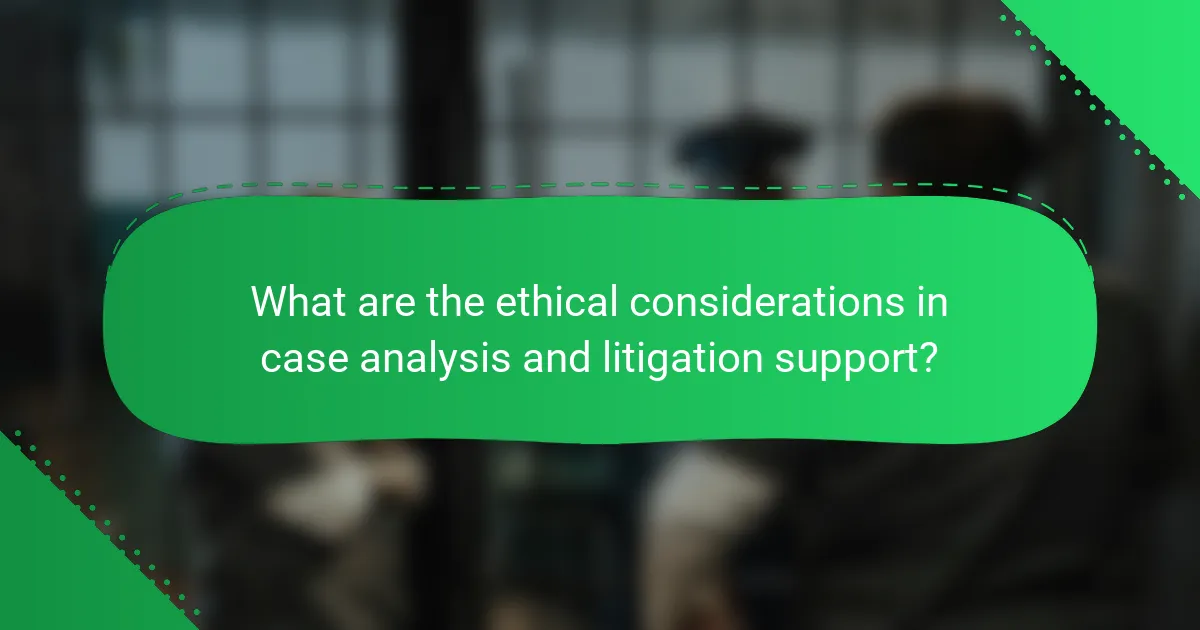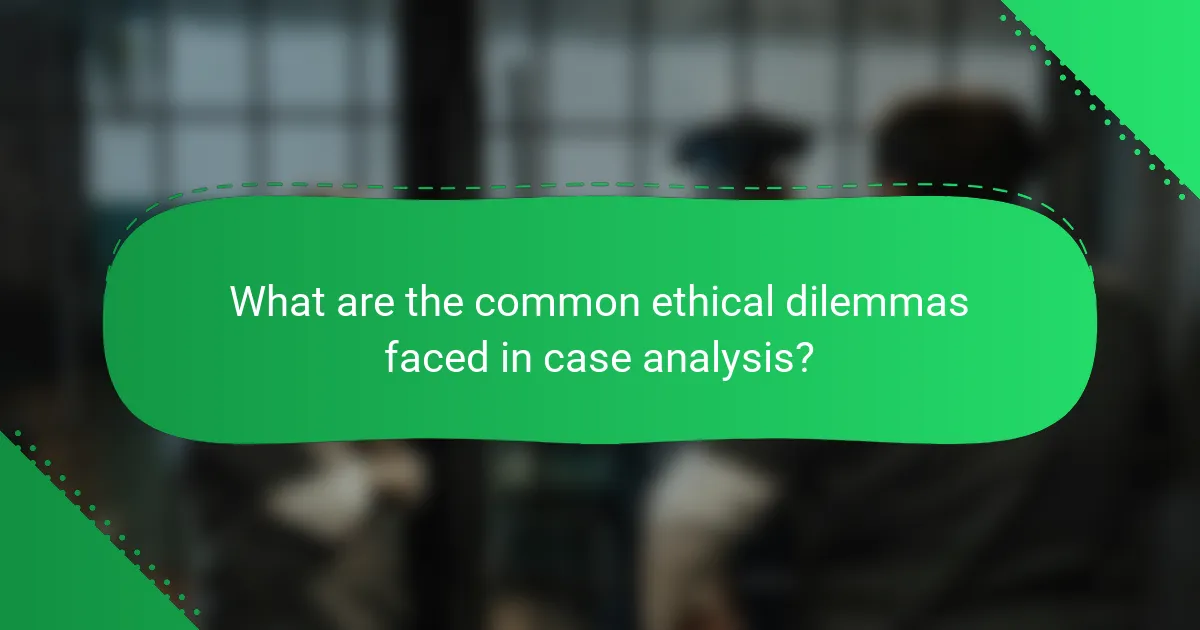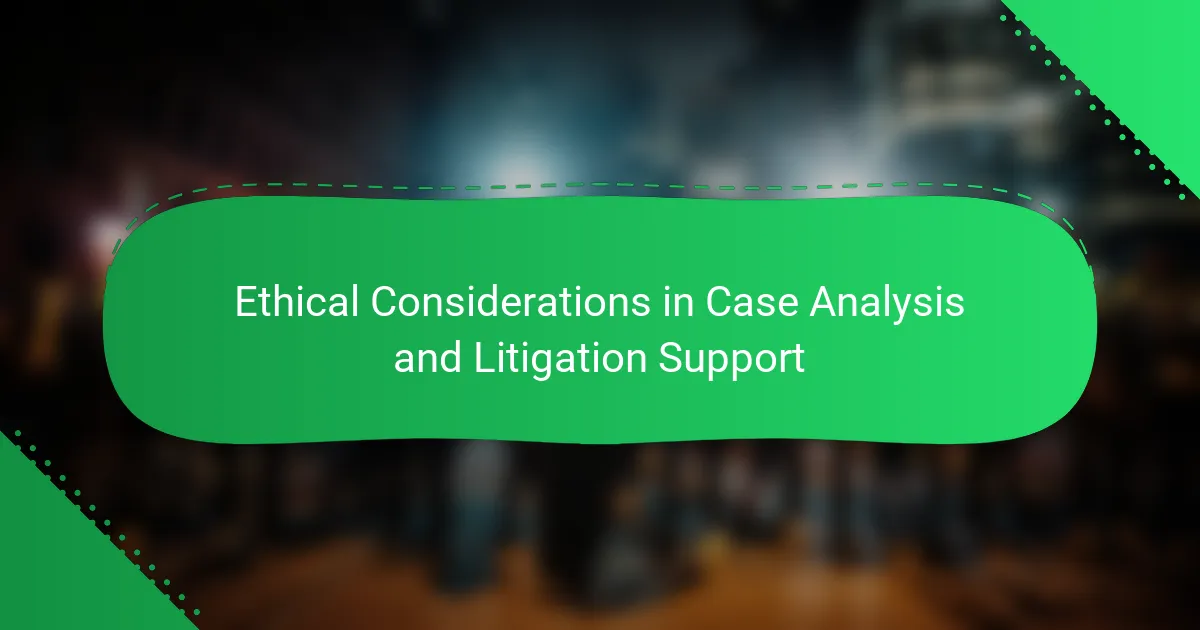Ethical considerations in case analysis and litigation support encompass critical principles such as confidentiality, integrity, and impartiality. Confidentiality protects sensitive information, while integrity ensures honesty in the presentation of facts and evidence, as misrepresentation can result in severe legal consequences. Impartiality is vital for maintaining fairness, requiring analysts to avoid conflicts of interest. Common ethical dilemmas include breaches of confidentiality, conflicts of interest, and misrepresentation of facts, all of which can undermine the integrity of the analysis. Upholding ethical standards is essential for credibility, and professionals are encouraged to adhere to established codes of conduct, engage in regular training, and practice transparent communication to foster trust and accountability in their work.

What are the ethical considerations in case analysis and litigation support?
Ethical considerations in case analysis and litigation support include confidentiality, integrity, and impartiality. Confidentiality ensures that sensitive information remains protected. Legal professionals must avoid disclosing privileged communications. Integrity requires honesty in presenting facts and evidence. Misrepresentation can lead to legal consequences. Impartiality is essential to maintain fairness. Analysts must avoid conflicts of interest. The American Bar Association’s Model Rules of Professional Conduct outline these ethical obligations. Adhering to these principles fosters trust in legal proceedings.
How do ethical standards influence case analysis?
Ethical standards significantly influence case analysis by guiding the decision-making process. They establish a framework for integrity and accountability. Adhering to ethical standards ensures that case analysis is conducted fairly and transparently. This promotes trust among stakeholders, including clients and the legal system. Ethical guidelines also help prevent conflicts of interest and bias in analysis. They require analysts to prioritize the truth and uphold professional conduct. Research indicates that ethical breaches can lead to flawed analyses and negative outcomes. Thus, ethical standards are essential for maintaining the credibility and reliability of case analysis.
What are the key ethical principles involved in case analysis?
The key ethical principles involved in case analysis include integrity, confidentiality, and objectivity. Integrity requires analysts to be honest and transparent in their findings. Confidentiality mandates that sensitive information is protected and not disclosed without permission. Objectivity ensures that analysts remain impartial and avoid bias in their evaluations. These principles are essential for maintaining trust and credibility in the analysis process. Adhering to these ethical standards fosters a responsible approach to case analysis, ultimately benefiting all parties involved.
How do ethical standards shape the role of litigation support professionals?
Ethical standards significantly shape the role of litigation support professionals by guiding their conduct and decision-making. These standards ensure that professionals uphold integrity, confidentiality, and impartiality in their work. Adhering to ethical guidelines fosters trust between clients and legal teams. It also helps maintain the credibility of the legal process. Litigation support professionals must navigate complex ethical dilemmas, such as data privacy and evidence handling. Clear ethical frameworks provide direction in these situations, promoting responsible practices. Ultimately, ethical standards enhance the quality and reliability of litigation support services.
Why is ethical decision-making important in litigation support?
Ethical decision-making is crucial in litigation support because it ensures integrity and fairness in the legal process. It helps maintain the trust of clients, courts, and the public. Ethical practices prevent conflicts of interest and promote transparency. They also safeguard the rights of all parties involved. Adhering to ethical standards reduces the risk of legal malpractice. Studies show that ethical behavior enhances the credibility of legal professionals. Moreover, it contributes to a just outcome in legal disputes. Overall, ethical decision-making is foundational to effective litigation support.
What are the potential consequences of unethical practices in litigation support?
Unethical practices in litigation support can lead to severe consequences. These consequences include loss of credibility for legal professionals. Clients may lose trust in their attorneys, affecting future business. Courts may impose sanctions on attorneys for unethical behavior. This can result in financial penalties or even disbarment. Additionally, unethical practices can compromise the integrity of the legal process. Evidence may be deemed inadmissible if obtained unethically. Ultimately, the pursuit of justice can be undermined, impacting all parties involved in litigation.
How can ethical decision-making enhance the integrity of legal processes?
Ethical decision-making enhances the integrity of legal processes by promoting fairness and accountability. When legal professionals adhere to ethical standards, they ensure that all parties are treated justly. This adherence fosters public trust in the legal system. Trust is essential for the effective functioning of legal processes. Ethical decision-making also reduces the risk of misconduct and corruption. Studies show that jurisdictions with strong ethical guidelines experience fewer legal disputes. Furthermore, ethical practices encourage transparency in legal proceedings. Transparency allows for greater scrutiny and oversight. Ultimately, this leads to more equitable outcomes in the justice system.

What are the common ethical dilemmas faced in case analysis?
Common ethical dilemmas faced in case analysis include conflicts of interest, confidentiality breaches, and misrepresentation of facts. Conflicts of interest arise when personal interests interfere with professional judgment. Confidentiality breaches occur when sensitive information is disclosed without consent. Misrepresentation of facts involves altering or omitting information to influence outcomes. These dilemmas can compromise the integrity of the analysis and lead to legal repercussions. Maintaining ethical standards is crucial for credibility in case analysis.
How do conflicts of interest arise in litigation support?
Conflicts of interest in litigation support arise when a professional’s duty to one party conflicts with their obligations to another. This can occur when a litigation support provider has prior relationships with opposing parties. It can also happen if the provider has financial interests that could influence their work. For example, if a consultant is hired by one side but has previously worked for the other side, this creates a conflict. Additionally, if a provider has a familial or personal relationship with someone involved in the case, it may compromise their objectivity. The American Bar Association outlines these potential conflicts in their Model Rules of Professional Conduct. These rules emphasize the importance of transparency and disclosure to prevent ethical breaches.
What strategies can be employed to manage conflicts of interest?
Implementing clear disclosure policies is a key strategy to manage conflicts of interest. Organizations should require individuals to disclose any potential conflicts. This transparency helps identify issues before they escalate. Another effective strategy is to establish a conflict of interest committee. This committee can review disclosures and provide guidance. Regular training on conflict of interest policies is also essential. Educating employees promotes awareness and understanding. Additionally, creating a robust reporting system encourages individuals to report conflicts anonymously. Finally, enforcing strict penalties for non-compliance reinforces the importance of managing conflicts. These strategies collectively foster an ethical environment in case analysis and litigation support.
How can transparency mitigate potential ethical issues?
Transparency can mitigate potential ethical issues by fostering trust and accountability. When organizations are transparent, stakeholders have access to information about decisions and processes. This openness reduces the likelihood of misconduct and unethical behavior. For example, research shows that companies with transparent practices experience fewer ethical violations. A study by the Ethics & Compliance Initiative found that transparency correlates with higher employee morale and lower instances of unethical conduct. By providing clear communication, organizations can address concerns proactively. This approach encourages ethical decision-making and promotes a culture of integrity.
What role does confidentiality play in ethical case analysis?
Confidentiality is crucial in ethical case analysis. It protects sensitive information shared by clients and stakeholders. Maintaining confidentiality fosters trust between parties involved. Trust encourages open communication, which is essential for accurate assessments. Breaching confidentiality can lead to legal repercussions and damage professional reputations. Ethical guidelines, such as those from the American Psychological Association, emphasize the importance of confidentiality. These guidelines state that confidentiality must be upheld to ensure ethical practice. Thus, confidentiality plays a foundational role in ethical case analysis.
How can professionals ensure client confidentiality is maintained?
Professionals can ensure client confidentiality is maintained by implementing strict data protection policies. They should limit access to sensitive information only to authorized personnel. Regular training on confidentiality practices enhances awareness among staff. Utilizing secure communication methods protects client data during exchanges. Documenting consent for information sharing is essential for transparency. Professionals must also comply with relevant laws and regulations, such as HIPAA in healthcare. Regular audits of confidentiality practices can identify areas for improvement. By establishing a culture of confidentiality, professionals reinforce the importance of protecting client information.
What are the implications of breaching confidentiality in litigation support?
Breaching confidentiality in litigation support can lead to severe legal and ethical consequences. It undermines the trust between clients and their legal representatives. Such breaches can result in the loss of privileged information. This may compromise the integrity of the legal process. Legal professionals could face disciplinary actions, including disbarment. Courts may impose sanctions on parties involved in the breach. Additionally, clients may pursue civil lawsuits for damages incurred. Overall, confidentiality is crucial for effective litigation support and maintaining professional standards.

How can professionals uphold ethical standards in their practice?
Professionals can uphold ethical standards in their practice by adhering to established codes of conduct. These codes provide guidelines for integrity, honesty, and accountability. Regular training on ethical issues is crucial. This training helps professionals stay informed about best practices and legal obligations. Additionally, professionals should engage in transparent communication with clients and stakeholders. Transparency builds trust and ensures that all parties understand the processes involved. Seeking supervision or consultation when faced with ethical dilemmas is also essential. This practice allows for diverse perspectives and informed decision-making. Finally, professionals must consistently evaluate their actions against ethical standards. This ongoing self-assessment promotes a culture of ethical awareness and responsibility.
What best practices should be followed in ethical case analysis?
Best practices in ethical case analysis include maintaining objectivity and ensuring transparency. Analysts should avoid conflicts of interest and disclose any potential biases. It is crucial to respect confidentiality and protect sensitive information. Engaging in thorough research and using credible sources enhances the integrity of the analysis. Additionally, involving diverse perspectives can lead to more balanced conclusions. Regularly reviewing ethical guidelines ensures compliance with professional standards. Following these practices promotes trust and credibility in the analysis process.
How can continuous education improve ethical practices in litigation support?
Continuous education enhances ethical practices in litigation support by keeping professionals updated on legal standards and ethical guidelines. It provides training on recent developments in laws and regulations affecting litigation. This knowledge helps practitioners recognize and avoid ethical dilemmas. Continuous education also fosters a culture of accountability and integrity within organizations. Regular training sessions can emphasize the importance of ethical decision-making. Furthermore, it aids in developing critical thinking skills necessary for ethical evaluations. Research indicates that organizations with ongoing training programs see improved compliance with ethical standards. For instance, a study by the American Bar Association found that attorneys who engage in continuous education are less likely to face disciplinary actions.
What resources are available for professionals seeking to enhance their ethical understanding?
Professionals seeking to enhance their ethical understanding can access various resources. Key resources include professional organizations such as the American Psychological Association (APA) and the American Bar Association (ABA). These organizations provide guidelines and ethical standards relevant to their fields. Additionally, online courses and webinars on ethics are offered by universities and professional training platforms. Books on ethics in specific professions also serve as valuable resources. Journals focused on ethics publish research and case studies that contribute to understanding ethical dilemmas. Networking with peers can provide insights and shared experiences regarding ethical challenges.
What are the practical steps for addressing ethical issues in case analysis?
Identify the ethical issues present in the case analysis. This involves recognizing conflicts of interest, confidentiality breaches, and misrepresentation of facts. Engage stakeholders to gather diverse perspectives on the ethical dilemmas. This helps in understanding the implications of different viewpoints. Develop a framework for ethical decision-making. This framework should include guidelines that align with professional standards and legal requirements. Evaluate potential solutions to the identified ethical issues. Each solution should be assessed for its ethical implications and feasibility. Implement the chosen solution while ensuring transparency. Document the decision-making process and the rationale behind it. Review the outcomes of the implemented solution. This evaluation should focus on the effectiveness in addressing the ethical issues. Adjust practices based on feedback and lessons learned. Continuous improvement is essential for ethical integrity in case analysis.
How can professionals create an ethical framework for decision-making?
Professionals can create an ethical framework for decision-making by establishing clear guidelines based on core values. These values typically include integrity, accountability, and respect. They should start by defining the ethical principles that will guide their decisions. This can be achieved through stakeholder engagement and discussions to understand diverse perspectives.
Next, professionals should develop a decision-making process that incorporates ethical considerations at each step. This process might include identifying the ethical issues, evaluating the options, and considering the potential impact of decisions. Training and education on ethical standards are essential for all team members.
Additionally, professionals should implement mechanisms for accountability and transparency. Regular reviews of decisions and their outcomes can help in assessing adherence to the ethical framework. Finally, creating a culture of open communication encourages reporting of unethical behavior without fear of retaliation. This comprehensive approach helps ensure that ethical decision-making is embedded in organizational practices.
What role do peer reviews play in maintaining ethical standards?
Peer reviews play a crucial role in maintaining ethical standards in research and professional practices. They provide an independent assessment of the work, ensuring that it meets established ethical guidelines. This process helps to identify potential biases, errors, and ethical violations before publication or implementation. Peer reviewers are typically experts in the field, which adds credibility to the evaluation process. Studies have shown that peer-reviewed work is more likely to adhere to ethical standards compared to non-reviewed work. For example, a study published in the Journal of Medical Ethics found that peer review significantly reduces the incidence of unethical practices in published research. Thus, peer reviews serve as a vital mechanism for upholding integrity and accountability in various fields.
What tips can enhance ethical practices in litigation support?
Enhancing ethical practices in litigation support involves implementing clear guidelines and fostering transparency. Establishing a code of ethics is essential for all team members. Regular training on ethical standards can reinforce these principles. Utilizing secure data management systems protects sensitive information. Open communication among team members encourages accountability. Conducting regular audits ensures compliance with ethical guidelines. Engaging in peer reviews can provide additional oversight. Lastly, seeking feedback from clients can help identify areas for improvement.
The main entity of this article is “ethical considerations in case analysis and litigation support.” The article outlines essential ethical principles such as confidentiality, integrity, and impartiality, which are critical for maintaining trust and credibility in legal processes. It discusses how ethical standards influence case analysis, the role of litigation support professionals, and the importance of ethical decision-making. Additionally, the article addresses common ethical dilemmas, strategies for managing conflicts of interest, and the implications of breaching confidentiality, providing a comprehensive overview of best practices and resources for upholding ethical standards in the legal field.



